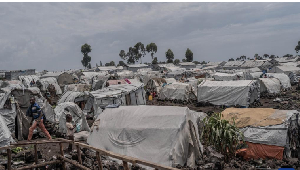Regional News of Tuesday, 10 February 2004
Source: GNA
Korle-Bu Hospital inaugurates new incinerator
Accra, Feb 10, GNA- Sheikh Ibrahim C. Quaye, Greater Accra Regional Minister on Tuesday pledged that Accra Metropolis would be cleared of filth within 90 days to make the city clean and safe for the residents. Sheikh Quaye said the cleaning exercise would start from Accra Central within a month and the rest of the city later.
The Greater Accra Regional Minister made the pledge at the inauguration of a 200 million cediS combustible incinerator at the Korle-Bu Teaching Hospital in Accra.
The locally manufactured incinerator donated to the Hospital by the Clay and Metal Products Ghana Limited a subsidiary of Metalex Limited is made up of bricks, metal and clay was designed to burn off domestic and industrial waste.
The eight metre incinerator has an in built drier that could dry wet waste very fast and a burning chamber for five tonnes of waste which could burn completely within three hours.
The Korle-Bu Hospital currently generates two tonnes of waste daily.
Sheikh Quaye commended the donors for their gesture and expressed the hope that, "when this incinerator works well, we will request for 50 of them to be built and placed at selected points in the city to help dispose waste".
The Greater Accra Regional Minister, said filth was the main problem facing the Capital City, therefore, provision of the incinerator should be pursued and promoted.
Ms Theresa Amarley Tagoe, Member of Parliament for Ablekuma South and a Deputy Minister of Lands and Forestry stressed the need to educate the public about keeping clean environment and adopting healthy lifestyles "so that our hospital bills would be reduced".
Professor Kwabena Frimpong-Boateng, Chief Executive Officer of the Hospital thanked the donors and said the incinerator, which uses gas was an improvement over the old one, which uses about 20,000 gallons of diesel every three months.
He said the authorities would explore avenues whether it could recycle the heat generated from the incinerator for other operations at the hospital or other health purposes.
Prof. Frimpong-Boateng said the hospital had also taken delivery of 100 dustbins, which had been placed at vantage positions to collect plastic and other waste generated by visitors, and patients who patronise the hospital.
He therefore appealed to the public to use the dustbins instead of littering around the hospital.
Mrs Wilhelmina Adjare Danquah, a representative of the donors said the incinerator was donated to help curb sanitation problems facing the hospital, reduce the cost of disposing off waste materials generated at the hospital and help divert resources to other areas of medical care. According to her, the incinerator required to be serviced once every six months and her organisation was ready to do that maintenance free of charge.










